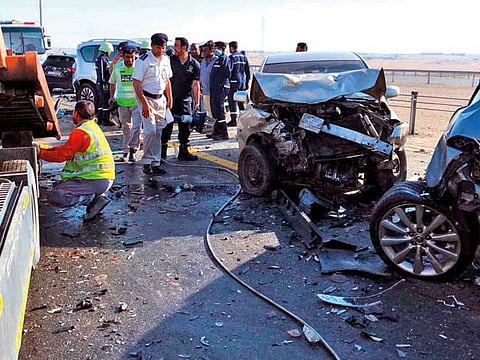Fog accident: Police arrest truck driver
Police said the driver violated the rule banning heavy vehicles on the road during peak hours and unstable weather

Abu Dhabi: Police have arrested a truck driver following the accident involving 44 vehicles on Shaikh Mohammad Bin Rashid Road this Tuesday.
Abu Dhabi Police said the driver violated the rule banning heavy vehicles on the road during peak hours and unstable weather conditions.
Since January 1, 2018, heavy vehicles and trucks were banned from Abu Dhabi’s roads during peak hours and unstable weather conditions.
Accordingly, truck drivers are not allowed to operate on the city's main roads from 6.30-9am and 3-6pm.
The smash-up caused minor to moderate injuries to 20 people, and left two with serious injuries.
Brigadier Ali Khalfan Al Dhaheri, Director of Central Operations Sector of Abu Dhabi Police, said the truck driver was arrested for violating the truck ban during peak hours, and for jeopardising the lives of other motorists.
Brig Al Dhaheri pointed out that the driver was charged in accordance with Article 342 and Article 424 for causing harm to others, for damaging the property of other, according to the Federal Penal Code, and for breaking Ministerial Resolution No. 70, 178/2017.
“Based on all the above mentioned violations committed by the truck driver, it was necessary to open a case and arrest the driver, who would then be brought to trial and face prosecution,” he said.
Brig Al Dhaheri emphasised that truck drivers should adamantly follow traffic rules at all times, and that violations against the truck timings will lead to a Dh1,000 fine and four black points.
Brigadier Khalifa Mohammad Al Khaili, director of Road Traffic Directorate of Abu Dhabi Police, visited the victims of the accident and wished them a speedy recovery on behalf of Abu Dhabi Police.
To prevent further road accidents during foggy weather, Brig Al Khaili advised motorists not to speed, and not to use their hazard lights except in emergencies, when drivers should stop their cars on the hard shoulder.



